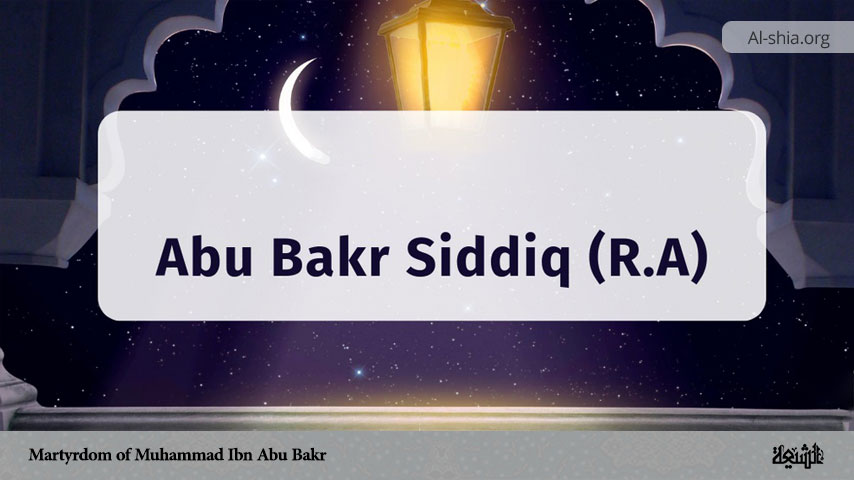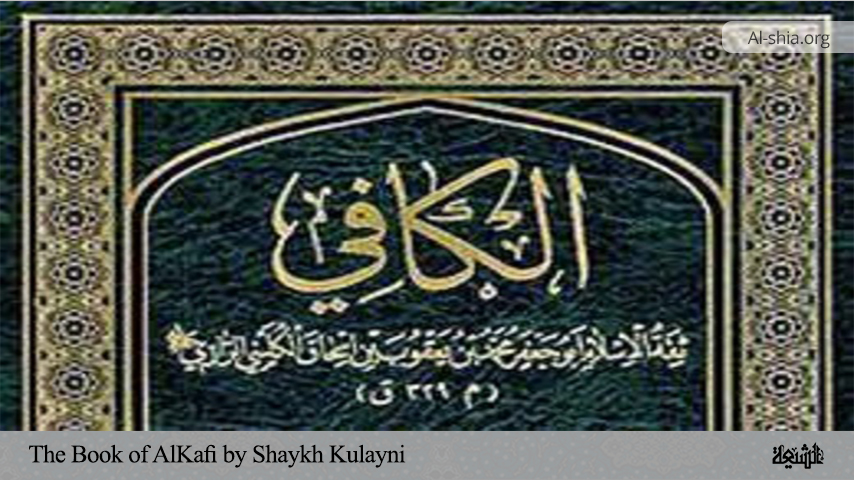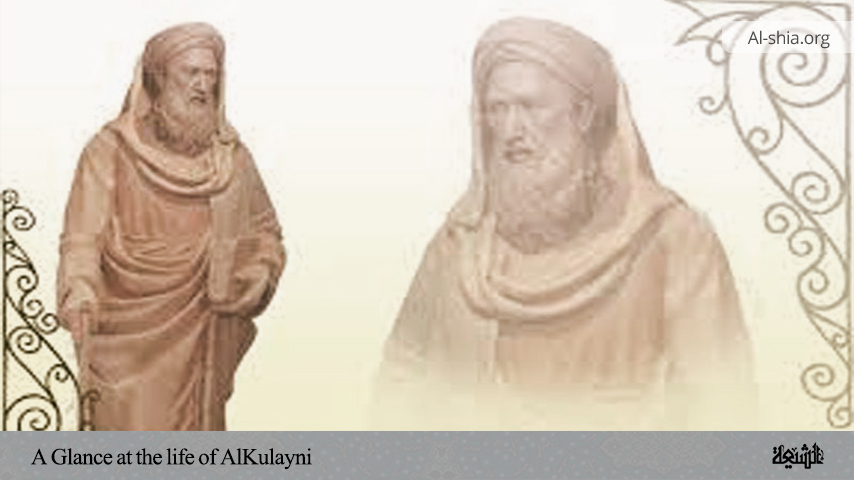Muhammad ibn Abu Bakr was the son of the first caliph and he was one of the closest companions of the Commander of the Faithful, Ali ibn Abi Talib (PBUH), who was appointed as the governor of Egypt during the caliphate of the latter. After the demise of Abu Bakr, Muhammad ibn Abu Bakr was raised in the house of Imam Ali. The Imam loved him so much to such an extent that he was considered as his own son. Moreover, the place Muhammad ibn Abu Bakr had in Imam Ali’s heart is sometimes compared to that of Abu Dhar in the heart of the Holy Prophet (peace be upon him and his family).
His Birth and Lineage
According to historical reports, Muhammad ibn Abu Bakr was born in the month of Dhul-Qa’dah, 10 A.H [corresponding to February 632] in a place known as Dhu l-Hulayfa (18 km from the city of Medina on the way to Mecca) when the Messenger of God (PBUHH) was on his way to Mecca for his Farewell Pilgrimage.
His father was Abu Bakr ibn Abi Quhafah, the first caliph and he passed away when Muhammad was only two years and several months old. His mother was Asma’ bint ‘Umays who was one of the prominent women of early Islam. She was first married to Ja’far ibn Abi Talib, and after his martyrdom, she later married Abu Bakr.
After the death of Abu Bakr, Asma’ married Imam ‘Ali (PBUH) and thus Muhammad came to live in the house of Imam Ali and was raised by the Imam. Muhammad was closely acquainted with the Imam’s lifestyle and character, which made him love the Imam abundantly. The Imam (PBUH) also loved Muhammad and would call him “My son”. In Nahj al-Balagha, it is reported that the Imam (PBUH) said, “He was my friend, and I raised him like my own child.”
His Personality
Most sources of early Islamic history acknowledge Muhammad’s honesty, righteousness, and nobility. Muhammad ibn Abi Bakr was a pious Muslim who supported the Imam of his time, Ali ibn Abi Talib, even though his sister Aisha opposed Ali in the Battle of Jamal. Although Muhammad was not a member of the pure Prophet’s Household [i.e., Ahl al-Bayt], but he was a noble person and a purest person among his own family.” Imam Ali (PBUH) is reported to have said, “May Allah forgive Muhammad! He strived as much as he could and fulfilled his duty.” Muhammad always wanted good for people. He would accept criticisms and would ask people to inform him of any wrong conduct they may notice from him. [ see: Thaqafī, al-Ghārāt, vol. 1, p. 226]
The place that he had in the Imam’s heart is comparable to that of Abu Dhar in the heart of the Prophet (PBUHH). He is one of the close disciples of Imam Ali [Ḥirz al-Dīn, Marāqid al-maʿārif, vol. 2, p. 246]. Muhammad ibn Abi Bakr believed that the first three caliphs before Imam Ali violated Imam Ali’s right to caliphate. He considered Imam Ali (PBUH) as the first person who believed in the Holy Prophet (PBUHH) and he supported him throughout his life. He believed that fighting against Mu’awiya was a battle for the sake of God.
His Wife and Children
According to the majority opinion, a daughter of Yazdgerd; the last Sasanian king was Muhammad’s wife. One of the children of Muhammad was Qasim, a jurist and scholar of Medina, who was one of the close companions of Imam Ali al-Sajjad (PBUH) and Imam Muhammad al-Baqir (PBUH). Qasim had a daughter called Umm Farwa, who married Imam Muhammad al-Baqir (PBUH) and became the mother of Imam al-Sadiq (PBUH).
During the caliphate of Uthman
The presence of Muhammad ibn Abu Bakr in the political and military activities started in the caliphate of the third caliph, Uthman ibn Affan. After reaching adulthood, Muhammad ibn Abi Bakr participated in several battles against non-Muslims during the caliphate of Uthman. Meanwhile, his opposition to Uthman started in one of these battles, known as the Suwara Battle, in which Uthman made Abdullah ibn Sa’d ibn Abi Sarh the commander of his naval forces, whereas the Messenger of God (PBUHH) had excommunicated this person and banished him from Hijaz and the Holy Qur’an had affirmed his unbelief [Qur’an 8:93]. Muhammad criticized this decision of ‘Uthman and his leaving aside the true companions of the Prophet (PBUHH) [Ḥusaynī, Mishkāt, No 83, p. 63].
However, a claim that Muhammad ibn Abi Bakr was one of the killers of the second caliph, Umar is unfounded because he was only thirteen years old at that time, in addition to the fact that there is no mention of this in the sources of early Islamic history.
There are different viewpoints among the historians concerning his role in murdering ‘Uthman ibn Affan. However, the viewpoint supported by the historical evidence is that Muhammad had a role in instigating people to revolt against ‘Uthman and had an active participation in besieging his home, but he was not the one who murdered him. Rather, ‘Uthman was murdered by other people after Muhammad left him.
During the caliphate of Imam Ali
Muhammad ibn Abi Bakr was one of the Elite Guard, a group of devoted fighters who had dedicated their lives to support Imam Ali. In the Battle of Jamal, Muhammad ibn Abi Bakr was appointed by the Imam (PBUH) as the commander of the infantry and he displayed great bravery in this battle. When the battle was over, he treated the defeated army with kindness. By the Imam’s command, he respectfully took his sister, Aisha, [Ibn Aʿtham, al-Futūḥ, p. 427; Ibn Athīr, al-Kāmil fī l-tārīkh, vol. 4, p. 11] in the company of forty Basran women to Mecca and from there to Medina [Ibn Athīr, al-Kāmil fī l-tārīkh, vol. 4, p. 9].
Muhammad had been appointed by Imam ‘Ali (PBUH) as the governor of Egypt before the Battle of Siffin, but according to a report, Muhammad participated in this battle against Mu’awiya, as he was one of the commanders of a section of the Imam Ali’s army in this battle.
In Ramadan 1, 36/February 21, 657, Imam Ali (PBUH) appointed Muhammad as the governor of Egypt. The first problem he faced in Egypt was the problem of “Deserters”, who gathered in Khirbita (a place in Egypt) after the murder of ‘Uthman to condemn his murder, refusing to pay allegiance to Imam Ali (PBUH). Several wars occurred between them and Muhammad’s army. However, the situation got more complicated and Muhammad was unable to keep everything under his control, so Imam ‘Ali (PBUH) decided to replace Muhammad with Malik al-Ashtar, who is more powerful and experienced.
When the Battle of Siffin ended, Mu’awiya decided to invade Egypt. He wrote a letter to the chiefs of the Deserters and invited them to join him, [see: Ṭabarī, Tārīkh al-umam wa l-Mulūk, vol. 4, p. 76; Ibn Athīr, al-Kāmil fī l-Tārīkh, vol. 4, p. 162] and so more than ten thousand men from the Deserters joined the army of Mu’awiya, whose commander was ‘Amr ibn al-‘As [see: Suyūṭī, Ḥusn al-muhāḍira fī Tārīkh miṣr wa al-qāhira, vol. 1, p. 583]. In an unequal battle between the Syrian army and the army of Muhammad ibn Abi Bakr, which consisted of only two thousand soldiers, the latter was defeated in al-Musannah.
His Martyrdom
There are different viewpoints among historians on how Muhammad ibn Abi Bakr was martyred. Most sources maintain that when his army was defeated by the Syrian army, his companions left him and fled. Muhammad alone sought refuge in a ruined place, where he was found and killed by Mu’awiya ibn Hudayj, one of the chiefs of the Deserters, and his body was burned by him [see: Ṭabarī, Tārīkh al-Umam wa l-Mulūk, vol. 4, p. 80; Ibn Ḥajar al-ʿAsqalānī, Tahdhīb al-tahdhīb, vol. 9, p. 70; Ibn Khaldūn, Tārīkh Ibn Khaldūn, vol. 1, p. 634]. Some have said that he was killed by Mu’awiya ibn Hudayj during the battle. It is also said that ‘Amr b. al-‘As captivated and killed him [see: Ibn Ḥajar al-ʿAsqalānī, Tahdhīb al-tahdhīb, vol. 9, p. 70].
However, the date of his martyrdom is reported to have been Safar, 38/July 658 [see: Thaqafī, al-Ghārāt, vol. 1, p. 285; Damīrī, Ḥayāt al-ḥayawān, vol. 1, p. 350]. When the news of his martyrdom reached Imam ‘Ali (PBUH), the Imam wept and said, “He was a righteous servant for Allah and a righteous son for us.” [see: Shūshtarī, Majālis al-mu’minīn, vol. 1, p. 278]
It is also reported that after Muhammad’s martyrdom, his sister Aisha would constantly curse Mu’awiya ibn Abi Sufyan, ‘Amr ibn al-‘As, and Mu’awiya ibn Hudayj. Muhammad’s mother, Asma’, is also reported to have died as a result of grieving for his son [see: Ibn Abī l-Ḥadīd, Sharḥ Nahj al-balāgha, vol. 6, p. 88].
Regarding the burial place of Muhammad ibn Abi Bakr, it is reported that he was buried outside Fustat in a mosque called Zimam (in Egypt), but some believe that only his head was buried there [see: Damīrī, Ḥayāt al-ḥayawān, vol. 1, p. 351].
Extracted from WikiShia: https://en.wikishia.net/view/Muhammad_b._Abi_Bakr






